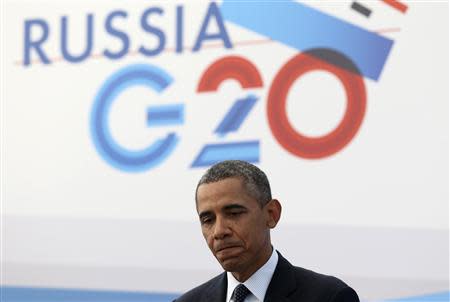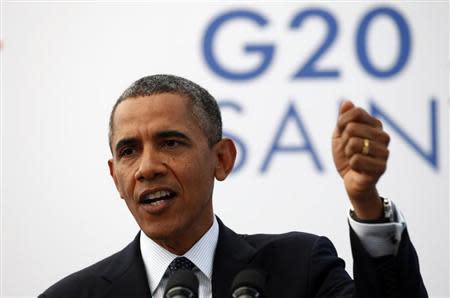Obama appeals to country to back U.S. military force in Syria
By Roberta Rampton and Susan Cornwell WASHINGTON (Reuters) - President Barack Obama appealed on Saturday to a dubious American public to back his bid to use military force in Syria while supporters scrambled to persuade lawmakers to authorize the move. Fresh from a European trip in which he failed to forge a consensus among global leaders on the need for a military strike on Syria, Obama told his war-weary country that America needs to use force to deter future chemical weapons attacks there. But the president, clearly still the reluctant warrior who rose to political prominence on his opposition to the Iraq war, said he did not want another costly and protracted conflict. "This would not be another Iraq or Afghanistan," Obama declared in his weekly radio address, previewing arguments he will make in a nationally televised address on Tuesday. "I know that the American people are weary after a decade of war, even as the war in Iraq has ended, and the war in Afghanistan is winding down. That's why we're not putting our troops in the middle of somebody else's war," Obama said. Lawmakers returning to Washington after a summer break say many of their constituents have told them they do not think the United States should respond militarily to the August 21 chemical weapons attack that Washington blames on Syrian President Bashar al-Assad's government. A Reuters/Ipsos poll this week said 56 percent of Americans believed the United States should not intervene in Syria; only 19 percent supported action. Obama said last week he would seek congressional approval for a strike, but early vote counts in do not look encouraging for the president, with scores of lawmakers still undecided. The U.S. Senate is expected to take action this week; the House of Representatives will vote later. House Democratic leader Nancy Pelosi on Saturday sent her fifth letter to Democratic lawmakers urging them to back Obama, noting that Congress had voted overwhelmingly to condemn Syria's acquisition of weapons of mass destruction a decade ago. The influential pro-Israel group AIPAC said it planned a major lobbying effort this week to try to round up support for military action, with about 250 activists in Washington to meet senators and representatives. In his radio address, Obama said failing to respond to the attack would threaten U.S. national security by increasing the chance of future chemical attacks from the Syrian government, terrorist groups, or other nations. The United States said more than 1,400 people were killed, including hundreds of children. "We are the United States of America. We cannot turn a blind eye to images like the ones we've seen out of Syria," he said. But it was unclear whether the wheedling was working. Senator Mark Pryor, a member of the president's Democratic Party who is running for re-election next year, said on Saturday that he would not support action against Syria at this time. Pryor said that before U.S. military action is taken, the administration must prove a compelling national security interest, define the mission and build a "true" coalition of participating allies - criteria he said had not been met. PROTESTS VERSUS PERSUASION Outside the White House, about 200 opponents of U.S. action in Syria gathered on Saturday, chanting "Hands Off Syria" and waving signs that read: "Tell Congress: no war on Syria." "The American people are tired of war. The government is not," said retired teacher Andra Sufi, 66, of northern Virginia, who was dressed in white and carried a rainbow "Peace" flag. "It will exacerbate things. It's not a solution." Democratic congressional aides said Obama's planned speech to the nation on Tuesday and briefings that top members of Obama's national security team will give to the entire House on Monday would prove pivotal in the thinking of many lawmakers. Administration officials have already given public testimony and daily closed-door briefings on Syria this week to members of Congress already in town, many of whom remain concerned that even limited strikes could draw the United States into a prolonged war and spark a broader regional conflict. White House chief of staff Denis McDonough goes on Sunday talk shows to make the case for action, and national security adviser Susan Rice will deliver a speech on Monday. On Tuesday morning, McDonough will visit House Democrats. In Vilnius, Lithuania, U.S. Secretary of State John Kerry on Saturday welcomed a European Union statement that said there appeared to be strong evidence that the Syrian government carried out the chemical attack on civilians. But the EU statement stopped short of lending support to military action. Obama has just returned from a Group of 20 summit in St. Petersburg, Russia, at which he won some support but no consensus for limited U.S. strikes. According to a CNN count aired on Saturday, just 25 U.S. senators have gone on the record in favor of military force, while 19 are against and the rest undecided. It will likely take 60 of the Senate's 100 members to advance the measure to the House of Representatives. In the House, where 218 votes will be required to pass the resolution, CNN said that just 24 members are on record in support of military action, with 119 opposed. (Additional reporting by Thomas Ferraro, Patricia Zengerle, Doina Chiacu; Editing by Doina Chiacu)


